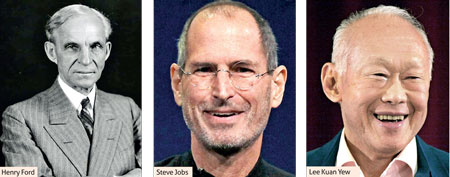25 Jul 2017 - {{hitsCtrl.values.hits}}
BY Dinesh Weerakkody
Steve Jobs, Henry Ford and Lee Kuan Yew – what did these titans have in common? They had a clear vision of the future and the leadership skills to manifest the future they desired.
They also surrounded themselves with great people, delegated authority and got out of the way. Leadership in the workplace is key to engaging and motivating employees to achieve strategic business goals.
Leadership is the top driver of sustainable results. Yet, only less than 50 percent of the employees report their top management is leading effectively.
Effective leaders
How can organisations build effective leaders and leadership? Leaders refer to the individuals who have unique skills to guide and influence the behaviour of others and achieve outstanding results. Leadership refers to an organisation’s capacity to build future leaders.
Leadership refers to an organisation’s capacity to build future leaders
An individual leader matters but an organisation’s leadership matters more over time. The quality of leadership in a country or a business drives performance both inside and outside the organisation.
Organisations with strong leadership depth will have the capacity to respond to the changing business conditions, execute strategy, increase investor confidence and anticipate and deliver customer requirements.
Often leadership success remains either inside the company (leaders learn from other leaders in the company who have succeeded) or inside the individual. The criteria of leadership should start with customers.
When the leaders inside the company behave in a manner that is consistent with the expectations of the customers (and other stakeholders) outside the company, the leadership will be more sustainable and effective. Companies that define internal leadership through external expectations will set more relevant and impactful leadership standards.
Leadership standards
In some companies, the board of directors assesses the CEO’s performance both inside the company with his team and among his employees and outside the company with key stakeholders. This type of assessment offers a more complete view of leaders who have roles with external stakeholders.
Assessment also may help determine high potential and future leaders by looking at the extent to which they have aspirations to lead, ability to meet future standards and agility to learn and grow.
Once leadership standards are set, the leaders need to be assessed on how well they meet those standards. With an external view, leadership 360s may be expanded to 720s where the customers, suppliers, communities or other external stakeholders may be included in assessing targeted leaders.
The traditional formula for leadership investment has been 70-20-10. The logic is that 70 percent of learning and development is on the job, 20 percent from feedback and observation of role models and mentors and only 10 percent from training. We think that this formula and should shift to something like 40 percent of learning from doing and experiencing.
Thirty percent of learning where the participant in training is immersed in the business while in the training session. This would mean prework to know what the participant should leave with, action learning during the training, relevant cases and problems to be solved, customers as faculty and participants and follow up to ensure that ideas taught had real impact; 30 percent of learning from experiences outside of work, social settings, social networks, volunteer work, reading and travelling.
When companies can encourage and access knowledge from these efforts, leaders will broaden their repertoire. This mix of leadership investments may be the basis for building leadership depth throughout an organisation to ensure a firm’s capacity to endure. Individual leaders can become more effective through coaching, mentoring, 720 feedback and individual development plans but to build leadership depth, companies need to invest in leadership development and establish a process to build a leadership pipeline.

(Dinesh Weerakkody is a HR thought leader)
06 Jan 2025 2 minute ago
06 Jan 2025 27 minute ago
06 Jan 2025 51 minute ago
06 Jan 2025 59 minute ago
06 Jan 2025 2 hours ago